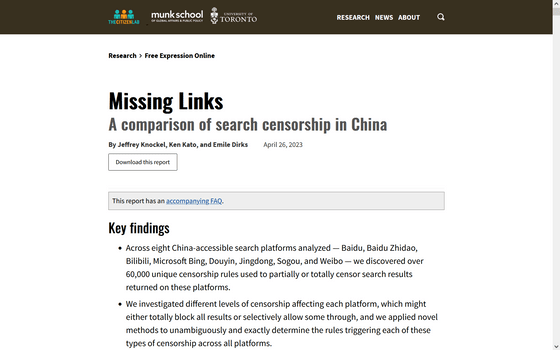It is clear that there are rules to censor more than 60,000 patterns of politics and religion on eight search sites such as Baidu and Bilibili for China

A survey of eight Chinese search platforms by Citizen Lab, a data analytics organization led by the University of Toronto, found that there are about 60,000 rules used to censor search results.
Missing Links: A comparison of search censorship in China - The Citizen Lab

FAQ: A comparison of search censorship in China - The Citizen Lab
Citizen Lab's Jeffrey Nockel and others investigated the most used search engine in China, Baidu, search engines Sogou, Microsoft Bing, social networking services Weibo, Douyin, Bilibili, and question-and-answer sites. Baidu Zhidao, e-commerce site Jingdong, eight search platforms. Of these, Microsoft Bing was the only platform not operated by a Chinese company.
Our research found over 60,000 censorship rules used to censor some or all of a search query across all eight search platforms. Many of the censorship rules target politically sensitive subjects, such as Chinese politicians like Xi Jinping, banned movements like Falun Gong , and references to significant historical events like Tiananmen Square. was There were also regulations covering illegal activities such as gambling, drug use, pornography and the sale of weapons.

Some of the censorship rules include words that mean “Chinese air balloon (Chinese spy balloon),” “Taiwan (the next Ukraine, Taiwan),” and “Arrest warrant Putin Xi Jinping.” It was said that it was done. In addition, the regulation extends not only to Chinese but also to English and Uyghur, and it is reported that Uyghur, which means 'freedom' and 'our homeland', was regulated.
According to Knockel et al., censorship can be broadly divided into 'soft' and 'hard' ones. Soft censorship refers to showing only results from 'certain authorized sources' for a given query, typically from Chinese government sites and Chinese state media. It seems that it is. Social Networks only shows search results from accounts that have received a certain level of approval and verification. Hard censorship refers to stricter censorship that results in zero search results for your query.

Of the eight platforms, only Microsoft Bing was a foreign-owned platform, and censorship was limited to users accessing from mainland China only. However, on the other seven platforms, censorship was applied to all users regardless of whether they were accessing from mainland China.
On the other hand, although Microsoft Bing is inferior to Baidu in the total number of censorship rules, it is also known that the 'political' censorship rules are wider than Baidu and affect more search results. ``This finding is counterintuitive that North American companies are no more violating the human rights of Chinese users than Chinese companies,'' Knockel and colleagues said.

Search engines such as Google control access to content that is illegal in some countries and prevent it from appearing in search results. ``Unlike Google and others, China mainly bans political and religious content that is inconvenient for the Chinese Communist Party,'' Nockel and colleagues point out.
``Although Baidu has more censorship rules than Bing, we found that Bing's political censorship rules are broader than Baidu and affect more search results. It questions the premise that Chinese tech companies are more censorship-resistant than Chinese companies, as other non-Chinese tech companies can offer their services without being subject to the same degree of regulation of political and religious expression as Chinese companies. It's a dire prediction of the potential for deployment.'
Related Posts:
in Web Service, Posted by log1p_kr







